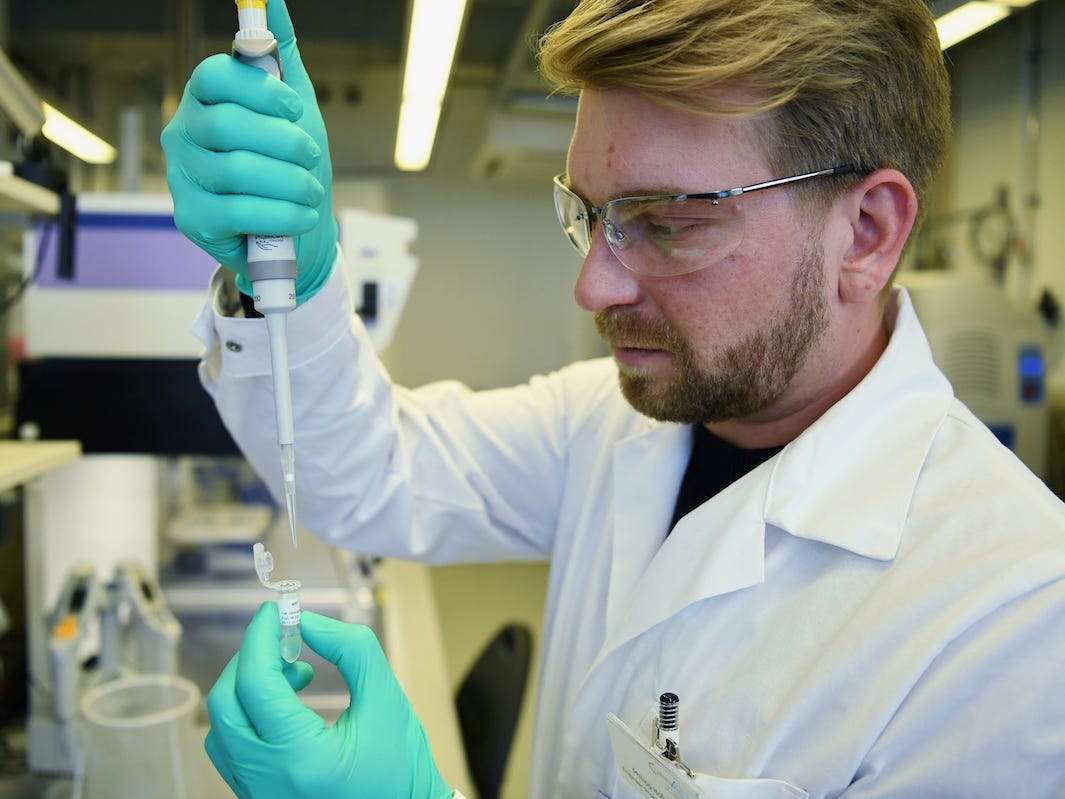
REUTERS/Andreas Gebert
- CureVac's experimental COVID-19 vaccine failed in a pivotal clinical study, the biotech said Wednesday.
- It's the first late-stage study to flop, with CureVac's vaccine showing 47% effectiveness.
- The German biotech saw its stock price drop by more than 50% in post-market trading.
- See more stories on Insider's business page.
A COVID-19 vaccine candidate developed by the German biotech CureVac failed in a critical late-stage study, the company said Wednesday.
It's the first failure of a major vaccine candidate in a final-stage trial. CureVac said an interim analysis showed the shot was 47% effective, falling short of the study's goals and the minimum bar for what US regulators find approvable.
The development is a setback to the world's immunization efforts, as European officials had previously reached deals to acquire up to 405 million doses of the shot.
Despite the disappointing result, CureVac CEO Franz-Werner Haas said the company plans to go "full speed for the final readout." The trial is still ongoing and the final vaccine efficacy figure may vary as more COVID-19 cases are tallied.
"We are still planning for filing for approval," Haas told The New York Times' Carl Zimmer.
CureVac, which is backed by The Bill & Melinda Gates Foundation, saw its stock price plummet following Wednesday's announcement. Shares were down more than 50% in post-market trading. The foundation owns about 3.1 million shares of CureVac, or 1.7% of the company, according to data compiled by Bloomberg.
An independent biostatistics expert said it will be nearly impossible for CureVac's study to still produce success. The 47% estimate of efficacy is based on 134 COVID-19 cases among study participants. "It's not going to change dramatically," Natalie Dean, a University of Florida biostatistician, told The Times.
CureVac blames variants, even as other vaccines hold up against different strains
In a statement, CureVac leaders said that the abundance of virus variants played a role in the result. Only one of the 134 analyzed cases resulted from the original strain of the SARS-CoV-2 virus, the company said.
"While we were hoping for a stronger interim outcome, we recognize that demonstrating high efficacy in this unprecedented broad diversity of variants is challenging," CureVac CEO Franz-Werner Haas said in a statement.
The disappointing result is surprising given some of the similarities CureVac's experimental vaccine candidate had with other, highly effective immunizations. CureVac's shot is a messenger RNA vaccine, a new technology platform that's also used by Moderna and Pfizer-BioNTech.
Those shots proved to be more than 90% effective in late-stage trials last year. They also appear to protect people against some major virus variants.
Other vaccines have also shown success against variants. Novavax, for instance, announced earlier this week its two-dose shot was 90% effective in a late-stage study. What's more, Novavax's vaccine was about 93% effective in preventing illnesses caused by variants of concern or variants of interest, the company said.
A quiet existence, until the pandemic
Since its founding in 2000, CureVac had a largely quiet existence until the pandemic. As one of the first companies trying to develop a COVID-19 vaccine, CureVac's CEO was invited to the White House in March 2020. Shortly after, reports circulated that the US had offered a "large sum" for access to its vaccine program. CureVac disputed the reports. The company also cycled through three CEOs in the span of a week.
Tesla CEO Elon Musk has also drawn attention to CureVac with his tweets. A Tesla subsidiary is working with CureVac in building a "prototype of an automated manufacturing unit," Insider reported in July.
In its Wednesday press release, CureVac focused attention on its second-generation coronavirus vaccine. Pharma giant GlaxoSmithKline has partnered with CureVac on that research, paying the company roughly $235 million upfront and investing an additional $180 million in multiple deals over the past year.
CureVac said it hopes this next-generation program could start human testing by the end of September, with the goal of launching in 2022.
Dr. Catherine Schuster-Bruce contributed reporting.

